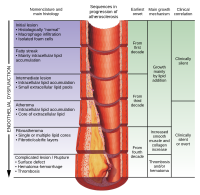
Photo from wikipedia
Lysophosphatidylcholine (lysoPtdCho) is produced mainly by the phospholipase A2-dependent hydrolysis of phosphatidylcholine (PtdCho) and can induce inflammatory activation and osteogenic gene expression in vascular smooth muscle cells. However, the mechanisms… Click to show full abstract
Lysophosphatidylcholine (lysoPtdCho) is produced mainly by the phospholipase A2-dependent hydrolysis of phosphatidylcholine (PtdCho) and can induce inflammatory activation and osteogenic gene expression in vascular smooth muscle cells. However, the mechanisms mediating these processes have not been fully elucidated. In this study, we investigated whether inhibition of protein kinase A (PKA) signaling suppressed lysoPtdCho-induced calcification of human aortic smooth muscle cells (HASMC). Calcium levels and alkaline phosphatase activity were significantly increased in HASMC treated with lysoPtdCho, but not PtdCho, compared with those in phosphate-buffered saline-treated HASMC. However, the addition of a PKA inhibitor (H-89) or PKA siRNA blocked lysoPtdCho-induced HASMC calcification. These results showed that lysoPtdCho could activate PKA-mediated HASMC calcification and that PKA may be a therapeutic target for lysoPtdCho-mediated vascular smooth muscle cell calcification.
Journal Title: Lipids
Year Published: 2019
Link to full text (if available)
Share on Social Media: Sign Up to like & get
recommendations!